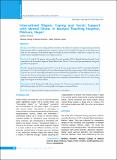Please use this identifier to cite or link to this item:
https://hdl.handle.net/20.500.14356/1439Full metadata record
| DC Field | Value | Language |
|---|---|---|
| dc.contributor.author | Shrestha, Sandhya | - |
| dc.date.accessioned | 2023-05-11T07:18:54Z | - |
| dc.date.available | 2023-05-11T07:18:54Z | - |
| dc.date.issued | 2019 | - |
| dc.identifier.citation | ShresthaS. (2019). Internalized Stigma, Coping and Social Support with Mental Illness in Manipal Teaching Hospital, Pokhara, Nepal. Journal of Nepal Health Research Council, 17(01), 80-84. https://doi.org/10.33314/jnhrc.v17i01.2011 | en_US |
| dc.identifier.issn | Print ISSN: 1727-5482; Online ISSN: 1999-6217 | - |
| dc.identifier.uri | http://103.69.126.140:8080/handle/20.500.14356/1439 | - |
| dc.description | Original Article | en_US |
| dc.description.abstract | Abstract Background: There are an increasing number of studies on the subjective experience of stigma amongst mentally ill persons but still few coming from Asian countries, and very few from Nepal. The objective of this study was to look into the experience of internalized stigma in mentally ill persons in Pokhara, Nepal and to compare this with similar studies using ISMI fromother socio-cultural contexts. Methods: A total of 136 patients with mentally ill people attending OPD of Manipal Teaching Hospital, Nepal responded to the Internalized Stigma of Mental Illness Scale. This is a 29-item self-report questionnaire with good psychometric properties. Results: Among the participant, majority 69.1% were 18-39 years age and majority 60.3% were female. Half of the participant 51.5% experienced high level of internalized Stigma. Regarding coping strategies, 86% of the participant response they does not avoid telling the health care professionals that they had a history of mental illness, Most 87.5% response they does not avoid going out with friends after receiving psychiatric treatment. Most 83.1% response they attempt to correct their friends if they hold negative views on people with mental illness. Most 65.44% were having High Social Support with Mental illness. Conclusions: Study findings show half of the participants (51.5%) experienced high level of stigma and more than half of the participant (65.44%) were having high social support with mental illness. Keywords: Coping; internalized stigma; mental illness; social support. | en_US |
| dc.language.iso | en | en_US |
| dc.publisher | Nepal Health Research Council | en_US |
| dc.relation.ispartofseries | Jan-March, 2019;2011 | - |
| dc.subject | Coping | en_US |
| dc.subject | Internalized stigma | en_US |
| dc.subject | Mental illness | en_US |
| dc.subject | Social support | en_US |
| dc.title | Internalized Stigma, Coping and Social Support with Mental Illness in Manipal Teaching Hospital, Pokhara, Nepal | en_US |
| dc.type | Journal Article | en_US |
| local.journal.category | Original Article | - |
| Appears in Collections: | Vol. 17 No. 1 Issue 42 Jan - Mar 2019 | |
Files in This Item:
| File | Description | Size | Format | |
|---|---|---|---|---|
| 2011-Manuscript-9275-1-10-20190429.pdf | Fulltext Download | 212.32 kB | Adobe PDF |  View/Open |
Items in DSpace are protected by copyright, with all rights reserved, unless otherwise indicated.
